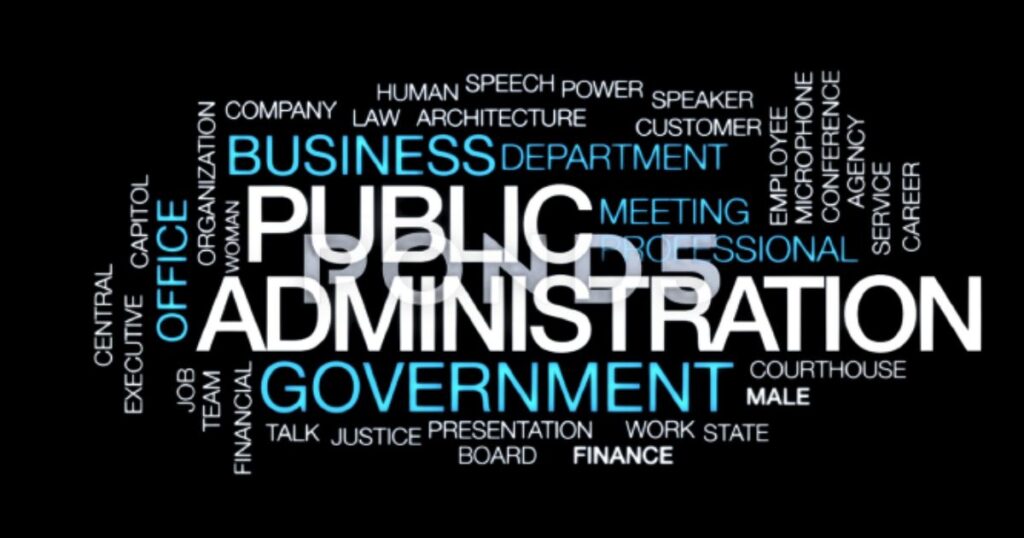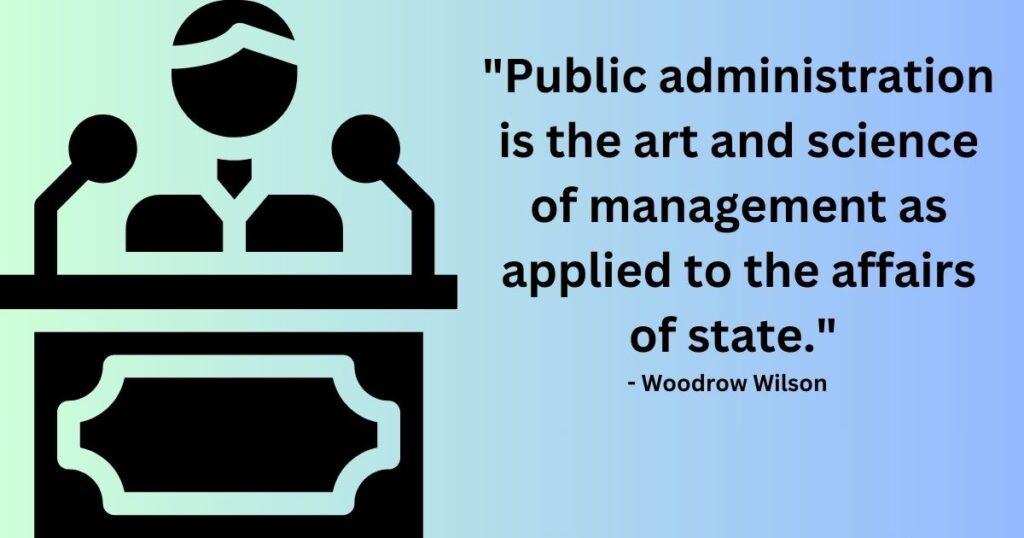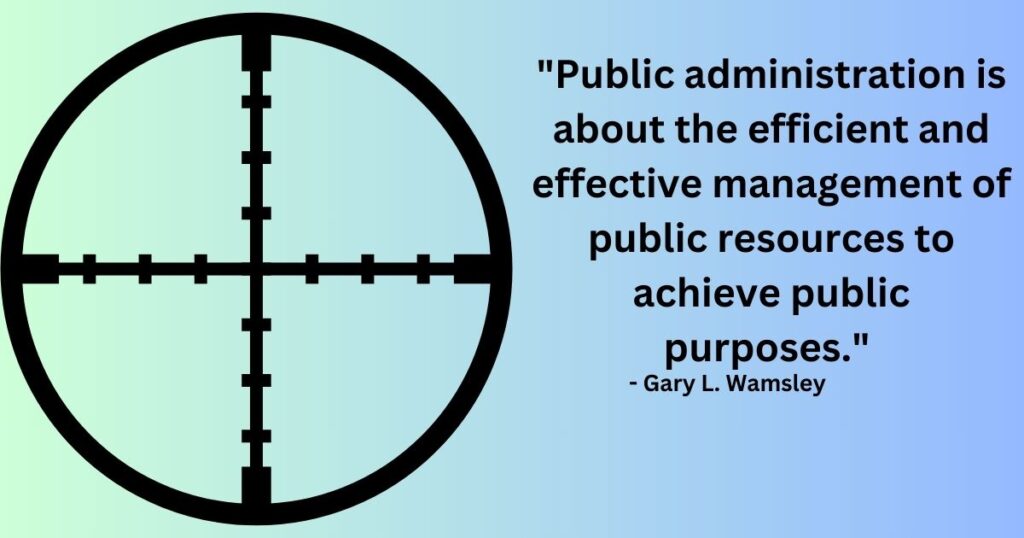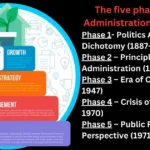Welcome to the Public Administration and It’s Meaning, Definition, Features & Purpose As a professional involved with the government, it is crucial to have a deep understanding of public administration. This field involves the management and implementation of government policies, programs, and services. By understanding the meaning, definition, nature, features, and purpose of public administration, you will be able to comprehend the complexities and significance of this field. This comprehensive understanding will allow you to contribute to the betterment of society as a whole.
Contribution of Woodrow Wilson:
He often called the “Father of Public Administration,” started the field in 1887 with his essay “The Study of Administration.” In simple terms, he believed that managing government should be like a science, separate from political issues. Wilson thought it was crucial to have a professional and non-political bureaucracy to implement policies effectively.
Key Takeaways
- Public administration involves the management and implementation of government policies, programs, and services.
- Understanding the meaning, definition, nature, features, and purpose of public administration is crucial for professionals involved with the government.
- Public administration is important for promoting public welfare, ensuring social justice, enhancing public participation, and fostering economic development.
- The characteristics and functions of public administration enable the achievement of public goals.
- The scope of public administration encompasses a wide range of activities, including policy formulation and implementation, budgeting, human resource management, public service delivery, and intergovernmental relations.
Public Administration and It’s Meaning, Definition, Features & Purpose

Public administration is a vital field that revolves around managing and implementing government policies, programs, and services. In other words, it refers to the coordination and organization of resources to achieve public objectives while improving the lives of citizens. Therefore, it is essential to understand the meaning of Public Administration to gain a better understanding of this critical field.
The term “Public Administration” is derived from the Latin word “publicus,” which means “of the people.” Accordingly, Public Administration can be defined as a field of study and practice that focuses on planning, organizing, directing, coordinating, and controlling public agencies and institutions. These organizations operate in the public interest and aim to improve the well-being of society as a whole.
Public administration is a complex field, and its meaning encompasses various activities related to government management, decision making, policy implementation, and public sector governance. It involves the efficient and effective management of public resources like people, money, and material to serve the common good of the community.
Public administration is primarily concerned with managing public affairs and ensuring that the government is run effectively, efficiently, and transparently. The field is interdisciplinary, comprising various functional areas of specialization such as finance, human resources, policy analysis, and strategic planning. By its very nature, public administration is closely aligned with the democratic process and aims to promote social equity, economic development, and accountability to the citizens it serves.
In general, understanding the meaning of public administration is critical to comprehending the complexities and significance of this field. It provides a framework for analyzing the role and function of public organizations, the management of public resources, and the conduct of public officials. By recognizing its importance in promoting public welfare and effective governance, we can contribute to the betterment of society as a whole.
The Definition of Public Administration
Public Administration can be defined as the study and practice of planning, organizing, directing, coordinating, and controlling public agencies and institutions. It encompasses various activities related to government management, decision making, policy implementation, and public sector governance.
The field of public administration is concerned with the effective and efficient management of public resources, including financial, natural, and human resources, to meet the needs and expectations of citizens. The focus is on maximizing public value and ensuring social and economic development through the provision of public services and goods.
Public administration is a multidisciplinary field that draws upon various disciplines such as political science, economics, law, sociology, psychology, and management. It is a constantly evolving field that adapts to changing societal needs and expectations.
The practice of public administration involves the development and implementation of policies and programs that are aimed at addressing public problems and promoting public welfare. Public administrators must work within legal and ethical frameworks to ensure the effective and efficient delivery of public services. They must also be responsive to the needs and expectations of citizens and stakeholders.
The Nature of Public Administration
The nature of public administration is diverse and multi-dimensional, shaped by a variety of factors that reflect its role in serving the public interest. It encompasses a wide range of activities and responsibilities that are focused on achieving public goals and promoting social welfare.
Public interest: Public administration is fundamentally concerned with serving the public interest, which refers to the well-being and benefit of the general public. This means that the policies, decisions, and actions taken by public administrators must be guided by the principles of fairness, equity, and justice, and must be oriented towards the common good.
Democratic process: Public administration is an essential component of the democratic process, as it involves the implementation of policies and programs that are designed to reflect the will and needs of the public. Administrators must work within the legal and institutional frameworks of democratic governance, which emphasize transparency, accountability, and citizen participation.
Legal frameworks: Public administration operates within a complex legal and regulatory environment that governs its activities and ensures that they are consistent with the rule of law. This includes laws and regulations related to civil service, budgetary processes, procurement, and ethics, as well as constitutional and human rights protections.
Accountability to the public: Public administration is accountable to the public, as it is funded by taxpayer dollars and exists to serve the public interest. This means that public administrators are responsible for being transparent, efficient, and effective in their use of public resources, and for providing high-quality services that meet the needs of citizens.
The Features of Public Administration

Public administration exhibits unique features that distinguish it from other fields. These features ensure the effective management of public resources, adherence to legal and ethical standards, and the delivery of public services. Here are some of the features of public administration:
- Public accountability: Public administrators are accountable to the public and must act in the public’s interest.
- Neutrality: Public administrators must remain neutral and impartial in their decision-making processes.
- Professionalism: Public administrators must exhibit a high degree of professionalism in their conduct and interactions with the public.
- Hierarchical structure: Public administration follows a hierarchical structure, with clear lines of authority and responsibility.
- Specialization: Public administrators specialize in particular areas of public service delivery, such as education, healthcare, or transportation.
These features ensure the fair and equitable distribution of resources, adherence to legal and ethical standards, and efficient delivery of public services. Public administration is a crucial field that plays a vital role in promoting good governance, social equity, and economic development.
The Purpose of Public Administration
At its core, the purpose of public administration is to serve the public interest. Public administrators are responsible for ensuring the efficient and effective delivery of public services, as well as promoting social equity and economic development.
Through careful planning, budgeting, and management, public administration aims to create an environment that fosters the well-being and progress of society as a whole. It also plays a crucial role in promoting good governance and democratic principles, ensuring that public institutions are transparent, accountable, and responsive to public needs.
The purpose of public administration is multifaceted, and extends beyond service delivery and policy implementation. It also involves promoting public participation, protecting the rights of citizens, and addressing social and economic disparities.
As a public administrator, you have the opportunity to contribute to the betterment of society in a meaningful way. By understanding the purpose of public administration, you can help ensure that public institutions are responsive to the needs of citizens, and that government policies and programs are designed to promote the common good.
The Characteristics of Public Administration
Public administration is a complex and diverse field that exhibits several key characteristics. Understanding these characteristics is essential for ensuring effective governance and promoting public welfare.
Transparency
Transparency is a vital characteristic of public administration. It involves openness and accountability in decision making, resource allocation, and policy implementation. Transparent practices enable citizens to participate in the democratic process, hold officials accountable, and ensure fair and equitable distribution of resources.
Impartiality
Impartiality is another critical characteristic of public administration. It involves treating all citizens equally and without bias or prejudice. Public administrators are expected to make decisions based on merit, facts, and evidence, rather than personal or political considerations.
Effective Communication
Effective communication is crucial for successful public administration. It involves the clear and concise transmission of information between different actors, such as policymakers, administrators, and the public. Effective communication helps build trust, facilitate collaboration, and ensure efficient service delivery.
Adaptability
Adaptability is a crucial characteristic of public administration. It involves responding to changing circumstances and emerging challenges promptly. Public administrators must be able to adjust policies and procedures to meet new demands and ensure the effective and efficient use of resources.
Accountability
Accountability is a fundamental characteristic of public administration. It involves taking responsibility for decisions, actions, and outcomes. Public administrators are accountable to citizens and must work to ensure that public resources are used effectively and efficiently to achieve public goals.
The Scope of Public Administration

Public administration has a broad scope that encompasses various activities related to governance, management, and service delivery. It involves the formulation and implementation of public policies, the management of public resources, and the provision of essential services to citizens. The scope of public administration also includes intergovernmental relations, public finance, and human resource management.
Public administration interacts with various sectors and stakeholders, including government agencies, non-profit organizations, businesses, and citizens. It requires a multidisciplinary approach that draws on a range of fields, including political science, economics, law, sociology, and management. This interdisciplinary approach enables public administrators to address the complex challenges and issues facing governments and societies.
Furthermore, the scope of public administration is constantly evolving and expanding, influenced by technological advancements, demographic shifts, and social and political changes. It requires public administrators to remain adaptable, innovative, and responsive to emerging trends and issues.
The Functions of Public Administration
Public administration is an essential field that involves a wide range of functions to ensure the effective and efficient management of public resources. The following are the primary functions of public administration:
- Planning: Public administration involves the formulation of plans and policies to achieve public goals such as economic development, social justice, and public welfare.
- Organizing: Public administration involves the organization of resources such as people, money, and materials to achieve public objectives. This function includes determining the optimal structure and design of public agencies.
- Staffing: Staffing involves the recruitment, selection, and training of personnel to perform various public administration tasks and functions.
- Directing: Directing involves motivating, leading, and supervising public employees to achieve public goals and objectives.
- Coordinating: Coordinating involves integrating and harmonizing the activities of different public agencies to achieve public goals and objectives.
- Budgeting: Budgeting involves the allocation of financial resources to different public agencies and projects to achieve public goals and objectives.
- Evaluating: Evaluating involves the monitoring and assessment of public agency performance and the effectiveness of public policies and programs.
These functions ensure the effective and efficient operation of public agencies and the achievement of public goals and objectives. Public administration professionals perform these functions in adherence to legal and ethical standards while promoting transparency, accountability, and public participation.
The Importance of Public Administration
Public administration plays a vital role in ensuring the proper functioning of government systems, the implementation of public policies, and the delivery of essential services to citizens. It is a critical aspect of governance and is essential for promoting good governance, social equity, and economic development.
Effective public administration ensures that government policies and programs are efficiently and effectively implemented, resulting in improved public service delivery and citizen satisfaction. It fosters transparency, accountability, and impartiality in government decision-making processes, which are essential for building trust with citizens.
Public administration also plays a crucial role in promoting social equity by ensuring that public resources are allocated fairly and equitably. It ensures that vulnerable and marginalized populations have access to essential services, such as healthcare, education, and housing, thereby promoting social justice.
Furthermore, public administration is essential for fostering economic growth and development. Effective management of public resources and infrastructure is crucial for attracting and retaining investment, promoting job creation and entrepreneurship, and enhancing the business environment.
In summary, public administration is of utmost importance as it ensures the proper functioning of governments, the implementation of public policies, and the delivery of essential services to citizens. It plays a critical role in promoting good governance, social equity, and economic development, making it an essential field in contemporary society.
You Can Read: Panchayat Raj System in India during British Era
Conclusion
In conclusion, understanding the meaning, definition, nature, features, scope, functions, and importance of public administration is crucial for comprehending the complexities and significance of this field. Public administration plays a vital role in promoting good governance, social equity, and economic development by ensuring the proper functioning of governments and the effective delivery of essential services to citizens.
By recognizing the public interest, the need for transparency and accountability, adherence to legal and ethical standards, and efficient delivery of public services, public administrators can contribute to the betterment of society as a whole. As a journalist, you can play a crucial role in reporting on the various aspects of public administration, thereby enhancing public awareness, understanding, and participation in government affairs.
FAQ
Q: What is the meaning of public administration?
A: Public administration refers to the management and implementation of government policies, programs, and services.
Q: How do you define public administration?
A: Public administration can be defined as the study and practice of planning, organizing, directing, coordinating, and controlling public agencies and institutions.
Q: What is the nature of public administration?
A: The nature of public administration is characterized by its focus on public interest, its role in the democratic process, its reliance on legal frameworks, and its accountability to the public.
Q: What are the features of public administration?
A: Public administration exhibits features such as public accountability, neutrality, professionalism, hierarchical structure, and specialization.
Q: What is the purpose of public administration?
A: The purpose of public administration is to promote public welfare, ensure social justice, enhance public participation, and foster economic development.
Q: What are the characteristics of public administration?
A: Public administration is characterized by transparency, impartiality, effective communication, adaptability, and accountability.
Q: What is the scope of public administration?
A: The scope of public administration encompasses policy formulation, budgeting, human resource management, public service delivery, and intergovernmental relations.
Q: What functions does public administration perform?
A: Public administration performs functions such as planning, organizing, staffing, directing, coordinating, budgeting, and evaluating.
Q: Why is public administration important?
A: Public administration is important as it ensures the proper functioning of governments, the implementation of public policies, and the delivery of essential services to citizens.












Very useful information ✨️ Thank you so much sir 😊
Welcome ☺️
Sir your blog is very helpful sir thanks 🙏
Sir your block is very helpful thanks a lot ☺️🙏
Thanks☺️
खुप सुंदर आणि माहितीपूर्ण मांडणी आहे सर
Thanks☺️